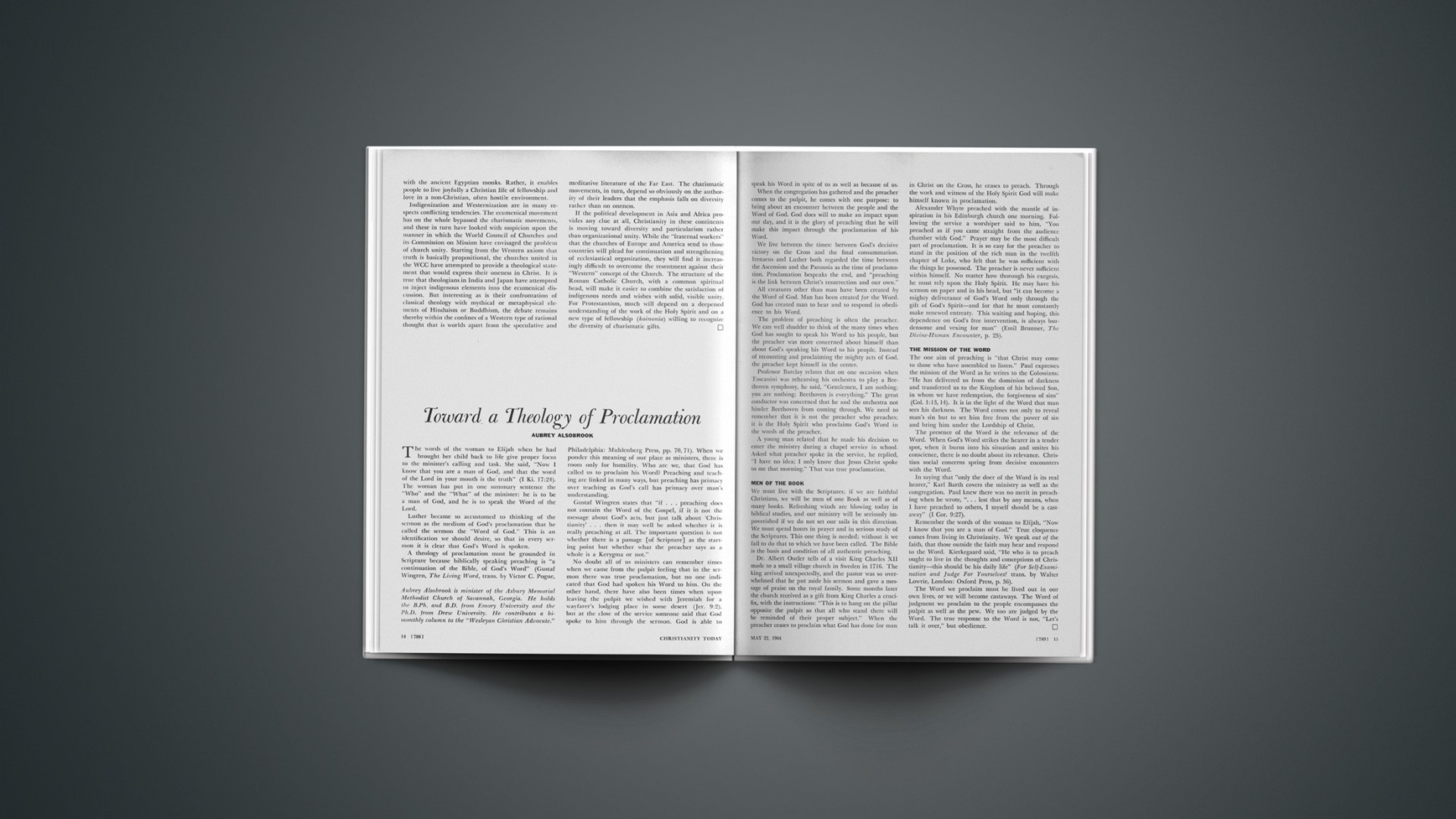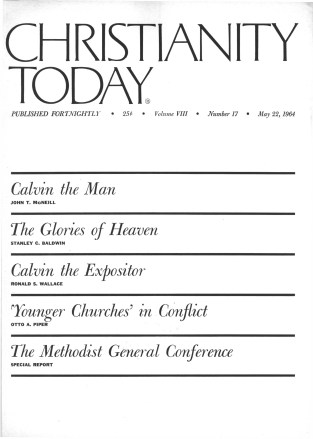The words of the woman to Elijah when he had brought her child back to life give proper focus to the minister’s calling and task. She said, “Now I know that you are a man of God, and that the word of the Lord in your mouth is the truth” (1 Ki. 17:24). The woman has put in one summary sentence the “Who” and the “What” of the minister: he is to be a man of God, and he is to speak the Word of the Lord.
Luther became so accustomed to thinking of the sermon as the medium of God’s proclamation that he called the sermon the “Word of God.” This is an identification we should desire, so that in every sermon it is clear that God’s Word is spoken.
A theology of proclamation must be grounded in Scripture because biblically speaking preaching is “a continuation of the Bible, of God’s Word” (Gustaf Wingren, The Living Word, trans. by Victor C. Pogue, Philadelphia: Muhlenberg Press, pp. 70, 71). When we ponder this meaning of our place as ministers, there is room only for humility. Who are we, that God has called us to proclaim his Word? Preaching and teaching are linked in many ways, but preaching has primacy over teaching as God’s call has primacy over man’s understanding.
Gustaf Wingren states that “if … preaching does not contain the Word of the Gospel, if it is not the message about God’s acts, but just talk about ‘Christianity’ … then it may well be asked whether it is really preaching at all. The important question is not whether there is a passage [of Scripture] as the starting point but whether what the preacher says as a whole is a Kerygma or not.”
No doubt all of us ministers can remember times when we came from the pulpit feeling that in the sermon there was true proclamation, but no one indicated that God had spoken his Word to him. On the other hand, there have also been times when upon leaving the pulpit we wished with Jeremiah for a wayfarer’s lodging place in some desert (Jer. 9:2), but at the close of the service someone said that God spoke to Page him through the sermon. God is able to speak his Word in spite of us as well as because of us.
When the congregation has gathered and the preacher comes to the pulpit, he comes with one purpose: to bring about an encounter between the people and the Word of God. God does will to make an impact upon our day, and it is the glory of preaching that he will make this impact through the proclamation of his Word.
We live between the times: between God’s decisive victory on the Cross and the final consummation. Irenaeus and Luther both regarded the time between the Ascension and the Parousia as the time of proclamation. Proclamation bespeaks the end, and “preaching is the link between Christ’s resurrection and our own.”
All creatures other than man have been created by the Word of God. Man has been created for the Word. God has created man to hear and to respond in obedience to his Word.
The problem of preaching is often the preacher. We can well shudder to think of the many times when God has sought to speak his Word to his people, but the preacher was more concerned about himself than about God’s speaking his Word to his people. Instead of recounting and proclaiming the mighty acts of God, the preacher kept himself in the center.
Professor Barclay relates that on one occasion when Toscanini was rehearsing his orchestra to play a Beethoven symphony, he said, “Gentlemen, I am nothing; you are nothing; Beethoven is everything.” The great conductor was concerned that he and the orchestra not hinder Beethoven from coming through. We need to remember that it is not the preacher who preaches; it is the Holy Spirit who proclaims God’s Word in the words of the preacher.
A young man related that he made his decision to enter the ministry during a chapel service in school. Asked what preacher spoke in the service, he replied, “I have no idea; I only know that Jesus Christ spoke to me that morning.” That was true proclamation.
Men Of The Book
We must live with the Scriptures; if we are faithful Christians, we will be men of one Book as well as of many books. Refreshing winds are blowing today in biblical studies, and our ministry will be seriously impoverished if we do not set our sails in this direction. We must spend hours in prayer and in serious study of the Scriptures. This one thing is needed; without it we fail to do that to which we have been called. The Bible is the basis and condition of all authentic preaching.
Dr. Albert Outler tells of a visit King Charles XII made to a small village church in Sweden in 1716. The king arrived unexpectedly, and the pastor was so overwhelmed that he put aside his sermon and gave a message of praise on the royal family. Some months later the church received as a gift from King Charles a crucifix, with the instructions: “This is to hang on the pillar opposite the pulpit so that all who stand there will be reminded of their proper subject.” When the preacher ceases to proclaim what God has done for man in Christ on the Cross, he ceases to preach. Through the work and witness of the Holy Spirit God will make himself known in proclamation.
Alexander Whyte preached with the mantle of inspiration in his Edinburgh church one morning. Following the service a worshiper said to him, “You preached as if you came straight from the audience chamber with God.” Prayer may be the most difficult part of proclamation. It is so easy for the preacher to stand in the position of the rich man in the twelfth chapter of Luke, who felt that he was sufficient with the things he possessed. The preacher is never sufficient within himself. No matter how thorough his exegesis, he must rely upon the Holy Spirit. He may have his sermon on paper and in his head, but “it can become a mighty deliverance of God’s Word only through the gift of God’s Spirit—and for that he must constantly make renewed entreaty. This waiting and hoping, this dependence on God’s free intervention, is always burdensome and vexing for man” (Emil Brunner, The Divine-Human Encounter, p. 25).
The Mission Of The Word
The one aim of preaching is “that Christ may come to those who have assembled to listen.” Paul expresses the mission of the Word as he writes to the Colossians: “He has delivered us from the dominion of darkness and transferred us to the Kingdom of his beloved Son, in whom we have redemption, the forgiveness of sins” (Col. 1:13, 14). It is in the light of the Word that man sees his darkness. The Word comes not only to reveal man’s sin but to set him free from the power of sin and bring him under the Lordship of Christ.
The presence of the Word is the relevance of the Word. When God’s Word strikes the hearer in a tender spot, when it burns into his situation and smites his conscience, there is no doubt about its relevance. Christian social concerns spring from decisive encounters with the Word.
In saying that “only the doer of the Word is its real hearer,” Karl Barth covers the ministry as well as the congregation. Paul knew there was no merit in preaching when he wrote, “… lest that by any means, when I have preached to others, I myself should be a castaway” (1 Cor. 9:27).
Remember the words of the woman to Elijah, “Now I know that you are a man of God.” True eloquence comes from living in Christianity. We speak out of the faith, that those outside the faith may hear and respond to the Word. Kierkegaard said, “He who is to preach ought to live in the thoughts and conceptions of Christianity—this should be his daily life” (For Self-Examination and Judge For Yourselves! trans. by Walter Lowrie, London: Oxford Press, p. 36).
The Word we proclaim must be lived out in our own lives, or we will become castaways. The Word of judgment we proclaim to the people encompasses the pulpit as well as the pew. We too are judged by the Word. The true response to the Word is not, “Let’s talk it over,” but obedience.
Aubrey Alsobrook is minister of the Asbury Memorial Methodist Church of Savannah, Georgia. He holds the B.Ph. and B.D. from Emory University and the Ph.D. from Drew University. He contributes a bimonthly column to the “Wesleyan Christian Advocate.”










